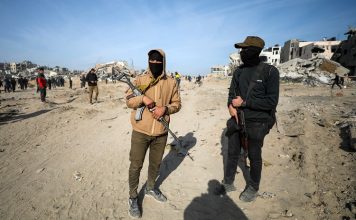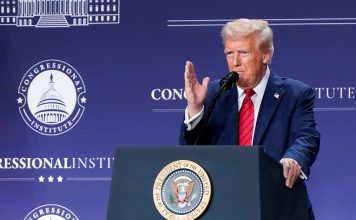By Ahmad Rafat
The Lebanese press and broadcast media have reported extensively on the recent marriage between Zeinab Soleimani, the daughter of General Ghasem Soleimani — the slain commander of the Islamic Revolutionary Guards Corps’ Qods Force (IRGC-QF) — and Reza Safi Al-Din, the son of Hashim Safi Al-Din, a Shia cleric and the head of Lebanese Hezbollah’s Executive Council.
Hashem Safi Al-Din is also the maternal cousin of Hassan Nasrallah, the Secretary-General of Hezbollah. The bridegroom’s uncle, Abdallah Safi Al-Din, is Hezbollah’s representative to Tehran.
[aesop_image img=”https://kayhanlife.com/wp-content/uploads/2020/07/zeynab-soleymani.jpg” panorama=”off” credit=”Zeinab Soleimani listening to Hassan Nasrallah in Beirut. Source: Kayhan London” align=”center” lightbox=”on” captionsrc=”custom” captionposition=”left” revealfx=”off” overlay_revealfx=”off”]
General Soleimani and Abu Mahdi al-Muhandis — the commander of Kata’ib Hezbollah (Hezbollah Brigades), part of the Popular Mobilization Forces (PMF) — were killed in a U.S. drone strike on Baghdad International Airport on January 3.
The PMF — also is known as the People’s Mobilization Committee (PMC) and the Popular Mobilization Units (PMU) — is an Iraqi state-sponsored umbrella organization comprising some 40 militias that are mostly Shia Muslim groups, but also include Sunni Muslim, Christian, and Yazidi groups.
Saad Kiwan, a Beirut-based Lebanese political analyst, told Kayhan Life: “The U.S. has put the bridegroom’s father and uncle on its list of terrorists, because as the head of Lebanese Hezbollah’s Executive Council, Hashim Safi Al-Din is the second man in the organization, and Abdallah Safi Al-Din is allegedly a prolific international drug smuggler.”
“Iran is using this political marriage to let the Lebanese people and others in the region know that it has no intention of leaving the country,” Mr. Kiwan said. “The convenient union between the children of two terrorists could not have any other purpose, given that both countries are under crippling sanctions and facing economic collapse.”

Some international counter-narcotics agencies have referred to Abdallah Safi Al-Din, Hezbollah’s representative to Tehran, as “the ghost” in their reports. He is allegedly the key player in the Iran-Lebanon-Venezuela drug triangle. In 2018, the U.S. Department of Treasury named Abdallah Safi Al-Din as a significant supplier of narcotics to Europe and America.
“Hezbollah has been in the drug business for many years, including trafficking Lebanese hashish, Iranian-made hallucinogenic pills, heroin from Afghanistan, and Columbian cocaine. It relies on a vast network of Lebanese immigrants in Latin America,” Kiwan noted. “Hezbollah has increased its drug-smuggling operations in recent months to compensate for the massive loss of funding from Iran, which is in the grip of an economic crisis.”
“In recent weeks, counter-narcotic police in Egypt, Saudi Arabia, and Greece have seized three huge caches of drugs that had originally left from a port in Syria,” Kiwan said. “Police in all three countries believe Hezbollah was behind the shipment of the narcotics.”
The arrest of Alex Nain Saab Moran — better known as Saab — a Colombian-born businessman indicted by the U.S. for sanctions violations and money laundering, could be related to the Iran-Lebanon-Venezuela drug triangle. Mr. Saab was probably not directly involved in drug-trafficking, but he has been allegedly laundering money for the Colombian cartels, the family of the Venezuelan President Nicolas Maduro, and Hezbollah.
On June 12, police in the Republic of Cabo Verde, an island country in the Atlantic Ocean, detained Saab, who was accused by the U.S. authorities of bribing Venezuelan officials and funneling more than $350 million to overseas accounts as part of a food program intended to serve those going hungry in Venezuela. Saab was allegedly helping the regime in Venezuela with a gold-for-oil product scheme with Iran. Police reportedly arrested Saab when his private jet, traveling from Caracas to Tehran, stopped in Cape Verde to refuel.
“Alex Saab engaged with Maduro insiders to run a wide-scale corruption network they callously used to exploit Venezuela’s starving population. Treasury is targeting those behind Maduro’s sophisticated corruption schemes, and the global network of shell companies that profit from the former regime’s military-controlled food distribution program,” U.S. Treasury Secretary Steven Mnuchin said in July 2019. “The corruption network that operates the CLAP program has allowed Maduro and his family members to steal from the Venezuelan people. They use food as social control, to reward political supporters and punish opponents, all the while pocketing hundreds of millions of dollars through several fraudulent schemes.”
The global coronavirus lockdown has forced those Lebanese who took part in the October 2019 protests against the government’s mishandling of the economic crisis to stay home. Many of them have now returned to the streets, but this time they are shouting anti-Hezbollah slogans.
“Many people have concluded that Hezbollah has caused most of the problems in Lebanon,” Kiwan noted. “The protesters demand that the government implement UN Security Council resolution 1559 [adopted in September 2004, which calls for the free and fair presidential elections, and the remaining foreign forces to withdraw from the country]; Resolution 1680 [adopted in May 2006, urging Syria to respond positively to Lebanon’s request to delineate borders]; and resolution 1701 [intended to resolve the 2006 Lebanon War.]”
Speaking about Resolution 1559, Mr. Kiwan explained: “All groups have disarmed except Hezbollah, which claims exemption to the rule because it is a so-called resistance force. Controlling official and unofficial Syrian border crossings is a major source of revenue for Hezbollah. By controlling the borders, Hezbollah helps Syria bypass sanctions, and smuggles weapons and drugs through the crossings.”
Under Resolution 1701, the Lebanese military and 12,000 members of the UN peacekeeping forces patrol the Syrian-Lebanese border. Hezbollah also has a presence in some places. It has clashed with the UN forces frequently.
“Hezbollah forces are at the Israeli border, and a wrong move or miscalculation can restart the war between Israel and Lebanon,” Kiwan warned. “Only the complete implementation of these three resolutions can release Lebanon from the Islamic Republic and Hezbollah’s grips and help the country achieve independence.”
“The U.S. Congress will probably soon pass the Caesar Act, which will make it next to impossible for Lebanon and Syria to be economic partners,” Kiwan noted. “The Caesar Act will hasten the collapse of Lebanon’s fragile economy.”
The Caesar Syria Civilian Protection Act, also known as the Caesar Act, is a piece of U.S. legislation that sanctions the Syrian government, including President Assad, for war crimes against the Syrian population. The U.S. Caesar is a pseudonym for a Syrian military photographer who, in 2014, smuggled out of Syria and published thousands of pictures depicting torture and murder in Syrian prisons.
“Lebanon has been Syria’s backyard for many years,” Kiwan said. “Our borders are wide open to Syrian goods. Hezbollah uses Lebanon’s resources to keep [President Bashar] al-Assad in power. The organization has set up dozens of illegal border crossings that the Lebanese government has no control over.”
“Hezbollah is concerned about the increasing public demand for implementing the three UN resolutions, especially resolution 1559, which calls for the disarming of the organization. That is why Hezbollah\s supporters attacked the protesters in Beirut in recent days,” Kiwan added. “These were deliberate and coordinated attacks, targeting only the Christian and Sunni neighborhoods, to frame the violence against the protesters as a tribal and sectarian clash and not a political conflict.”
This article was translated and adapted from Persian by Fardine Hamidi.







